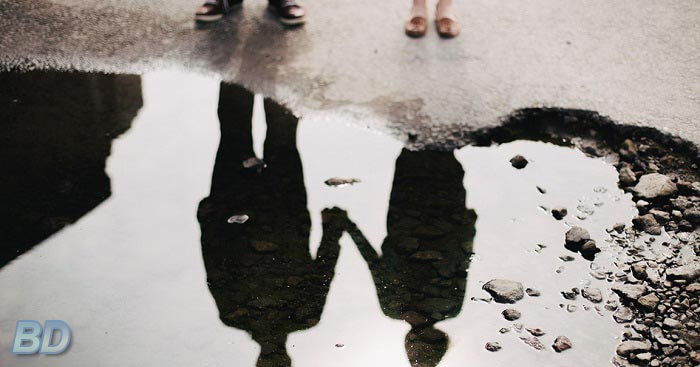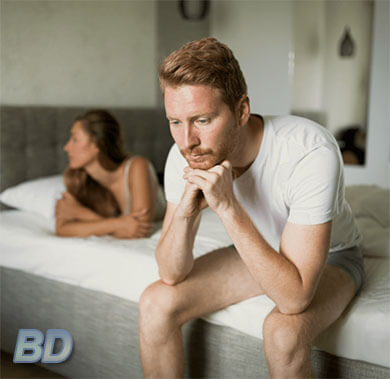Depression is a pathological state of mind. Carefully read this sentence. This is not a bad mood or melancholy. Unfortunately, not everyone understands this and ignores depression in the hope that the situation will improve tomorrow or the day after tomorrow, without any intervention. This will not happen. Depression requires an integrated approach to treatment, which begins with the acceptance of one's condition as a kind of pathology. Depression that occurs in a relationship is symptomatically indistinguishable from ordinary depression. The only significant difference is the context in which it arises. It is worth saying that treating depression in a relationship is a collective work. You must be ready to cooperate with your partner because the relationship is a game of two.
In this article, we will look at what depression in relationships is, what it is like to live with a person who has depression, about the reasons for which it occurs and how not to let depression ruin your relationship.

Depression in a relationship: why's it so common?
Recently, my girlfriend and I decided to go out in the evening and go to a Chinese restaurant. For us, this is a kind of tradition - every Friday or Saturday we go to the same restaurant, order a lot of all kinds of food, beer and slowly eat and drink it all, discussing the events of the past week. That time it was Thursday - not a typical day for going to a Chinese restaurant (for us, of course), but for the weekend we were going to visit my mom, so we decided not to interrupt the glorious tradition but shift it a little in the schedule. On this occasion, we decided to break another of our rules - to have dinner in a restaurant together - and invited our friends. These were two couples, our good and old friends. To be honest, we didn’t really expect that any of them would respond to the offer, but to our surprise, everyone had time and desire to come.
The evening was great - everyone drank, ate and discussed insignificant, banal, but such dear to heart events as a quarrel with the boss, watched movies, read books and so on. At the end of the evening, we traditionally broke into two "parties": boys with boys and girls with girls. The conversation smoothly flowed into a more serious matter: the relationship with our better halves. I was very surprised when I realized that our conversation was of a negative connotation - it turned out that the male part of our company is in a slightly depressed state (I would say that this is a moderate depression). Everyone complained about their relationship (“depression ruining my relationship” and so on), but no one gave specific arguments. It was more like a sad whining when people do not discuss specific problems but simply complain. I understand that this is also a necessary thing, sometimes you just want to complain. But I understood something else: my friends got confused and stopped understanding the reason for their despondency, apathy, and so on. This is a very typical situation for depression.
I can say that this phenomenon is massive today. Everyone suffers from depression - adolescents, adults, old people, sometimes even children. The problem is in the social and information environment in which we live. We expect that life will give us gifts, and minimal effort (which is sometimes required) will always bring 100% results. We rely too much on our own plans and our own strength, completely excluding life circumstances. But you need to be able to resist them. Growing tensions in society are a consequence of global marketing, cultivating the cult of greed and false self-sufficiency.
We cease to cope with ourselves and the outside world, under the weight of needs and unfulfilled desires, we suffer from depression. This affects all areas of our life - including romance. All are waiting for something from themselves, from the world and from each other, forgetting to voice these expectations, and then sincerely resenting the world when these expectations are not realized again.
That is why depression in relationships is so common: we talk very little with each other, we don’t know how to tolerate the wishes of another person, and don’t know how to identify our true needs.
So how to deal with depression in a relationship? Just start with reconsidering your attitude to life.
Depression in a Relationship: Symptoms and Causes
Depression can have many causes, but for some reason, relationships are the most underestimated factor in the emotional state. Perhaps because people want to believe that everything is not hopeless and will get better with time? Unfortunately, “over time” only aggravates depression, turning into a chronic, indestructible mental disorder.  That is why, at the first sign of it, it’s worth taking a critical look at one’s relationship. If you find more than half of these signs - it's time to think! Depression affecting your relationship is very dangerous.
That is why, at the first sign of it, it’s worth taking a critical look at one’s relationship. If you find more than half of these signs - it's time to think! Depression affecting your relationship is very dangerous.
You feel completely at the mercy of a partner
Some people are convinced that it is even not bad, in general: there is no need to solve anything, to bear the heavy burden of responsibility for the couple’s own life and future, but you can just relax and go with the flow. Unfortunately, there is a flip side to this disclaimer: the inevitable fall in self-esteem and the feeling of complete helplessness. Well, if such a “refusal of obligations” is not your personal choice, but the initiative of your overly powerful partner is even more so. Sooner or later you’ll face depression and relationship problems.
Your partner constantly criticizes you
Reasonable criticism is easy to distinguish from senseless in terms of subjective feeling: when criticism is reasonable, you do not feel resentment or hopelessness, and you understand that you are given good ideas. Uncontrolled criticism does not make any sense: you are hurt because you can’t change anything in yourself, but you are constantly twitching. “I do not like your styling,” “Why did you buy this dress?” - such judgments are usually made in the prosecutor’s manner and make you want to defend yourself, fight back, or - finally, hide.
The one who hears them constantly, in the end, inevitably begins to look for a problem in oneself, and if this constant condemnation comes from a significant person, then self-esteem drops. But the same can be said in another way: “I’m worried that men will flirt with you – you're too sexy with this bold hairstyle” or “I’m afraid that we will not be able to repay the loan, so I don’t approve of new purchases.” Agree, this is a completely different matter.
Your partner controls you all
Your figure, your diet, your clothes and hairstyle, your money, your friends, your avatars in social networks and how often you see your relatives ... The desire for control is not subject to control! Once started, it is easy to capture more and more territory. Maybe your partner doesn't even notice it. But the emotional impact can be very strong, especially if you never have conflicts over this. Depression is associated with a feeling of helplessness, and this situation sooner or later will lead to a real avalanche of this feeling.
Your partner is depressed
Depression is contagious. This especially affects, of course, sensitive people. A loved one is constantly in front of your eyes with all the symptoms of depression - bad mood, poor health, a complete lack of energy and motivation - and you are sad about this and you feel guilty about their condition (although no one is to blame). But your partner sees their whole life in dark tones, including their relationship with you. Depression in men and relationships are incompatible things.
Your partner is always right
To strive to be right is quite natural for a person, but only as long as he does not want to be right at any price in any situation. If your partner denies the very possibility that he, too, makes mistakes, this is a real problem. This is especially bad for your emotional health if he also has a penchant for statements in the spirit of “If someone doesn’t like something, no one holds anyone up.” In healthy adult relationships, needs, interests of both parties are taken into account: from the matters of dishes for dinner to the choice of the future apartment.
Everyone has the right to vote, and there is no undivided right. How is this related to depression? The absolute rightness of one person always means that the other is mistaken: that is, if your partner is always right, then you are always wrong. An alarming flywheel of introspection is launched - and as a result, the very feeling of helplessness arises, from which the path to the depths of depression begins.
Being in a Relationship with Someone with Depression
So how is it: being in a relationship with someone who has depression?
Pop culture has taught us that depression is something like a seasonal blues: many of us have heard (or said themselves) “I'm depressed today.” Of course, any person suffers bouts of depression - due to lack of sleep, problems at work, quarrels with a loved one and even bad weather. But as soon as the surrounding circumstances change, everything returns to normal. Depression is arranged differently: its causes can be deeply hidden, but it strongly influences a person’s life.
 Show that you are near
Show that you are near
Depressed people do not just feel lonely - they often feel ashamed and guilty for their feelings and emotions. Out of fear of being misunderstood, ridiculed, or rejected, they prefer to keep quiet about their experiences, do not seek help, or refuse to recognize the seriousness of their position. Having remained with their feelings one on one, many try to suppress and hide them - and only more are convinced of their own “abnormality”, worthlessness and uselessness. As studies confirm, it is precisely this feeling of separateness from other people that can lead to suicidal feelings - therefore, for people in depression, the support of relatives and friends is especially important.
Do not discount the feelings and experiences of a depressed person
If you have never had depression, then you are unlikely to fully understand the condition of your loved one. Dealing with depression in relationships, do not try to compare it with a “bad day” or just a difficult period in life (for example, a session or a change of work) and do not offer a person with depression to “tune in to a positive”. Even if you sincerely want to express support, such advice will only devalue the feelings of the person who is confronted with depression because he knows that everything is not so simple.
Do not take the words and actions of a depressed person personally
People with depression, as a rule, are not able to lead the same active lifestyle as before. For example, they stop responding to messages and calls, refuse offers to go out to dinner or go to the cinema, they may even miss your birthday or wedding. This one is of the most common effects of depression on relationships
The point here is completely not in you - just in the depressed state, there is no strength for anything. Depression and love relationships are all about help and understanding. This is a lot of work, but your better half needs it
Can a Relationship Cause Depression?
Definitely yes. Most often, the reasons are two things - the selfish behavior of one of the partners and boredom. As to the first, we have already said a lot. But what about boredom? Is it really able to lead us into depression and influence relationships?
A person who is in a relationship sees their life as the result of the actions of two people who are actually one. And if boredom begins to overwhelm them at some point, they automatically see the reason for this in the fact that their relationship is stuck in one place. Most likely, things are exactly like this: relations, in which nothing happens, sooner or later turn into a depressive existence of two people.
If you suddenly discover that your relationship is bothering you, you must immediately talk about it, otherwise, you will inevitably be confronted with depression face to face.
Your Comment
Log In Or Sign Up
To Leave Your Comment